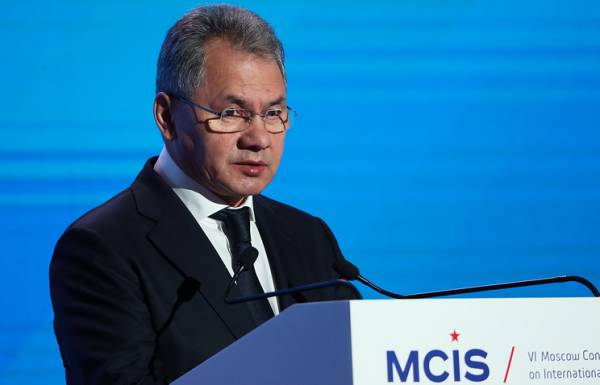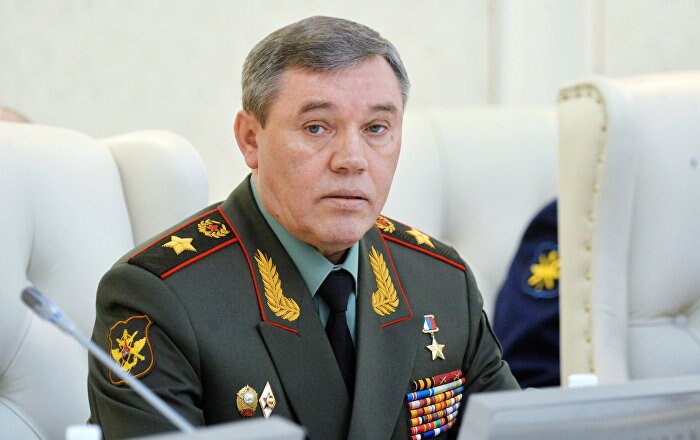In part II. MEMRI provides excerpts from the conference's "hosts" – Defense Minister Sergey Shoigu and Chief-of–Staff Valery Gerasimov As opposed to his 2016 address to the same forum Shoigu placed less emphasis on the "color revolutions" which he claimed were illicit attempts at regime change but basically stuck to military matters where he blamed NATO for both creating a climate of fear and building up its forces on Russia's borders. This was part of a NATO strategy that sought to deny Russia access even to its own sovereign territory. Gerasimov claimed that NATO-Russia relations had reached a post-Cold War nadir and accused NATO of launching an information war against Russia and sidelining the Russia-NATO Council that was envisaged to be a forum for ironing out differences.
Shoigu: NATO Is Establishing An Access Denial Zone That Includes Sovereign Russian Territories
"Instead of aspiring to unite the effort, Europe is cultivating anti-Russian phobias, exacerbating fears and imaginary threats from the East. Frightening the population and juggling with meanings are distorting the real situation (on the ground).
"Let me tell you, I want to underline it: Russia's actions aimed at boosting its own defense capabilities are a balanced reaction to the NATO alliance's expansion and increasing the military infrastructure in the states, bordering on Russia, while deploying military contingents there.
"NATO is a military –political bloc and not a philatelic club. It's trying to project power along the Russian borders, and attract into its orbit of influence an increasing number of new states.
"The latest decision on Montenegro's admission to NATO offers direct proof of the above. Podgorica's military potential is close to zero, but its geopolitical location enables to strengthen control over the Balkans.
"In the north of Norway, in immediate proximity to our borders, they've built a modern proving ground, where NATO's forces are deployed on a rotational basis.
"Activity falling under the so called NATO air "policing" mission" – patrolling the airspace of the Baltic states – is in fact a part of an access denial zone, which includes [Russian territory in the] Kaliningrad region and the eastern part of the Baltic sea.
"We consider such NATO actions as a demonstration of force-in promotion of its interests….
"Global security is also affected by the buildup of missile defense potential in Europe. Bulgaria, Poland, Romania, Spain and Norway are already involved in deploying land-based and naval components of the US missile defense system.
"2017 marks 45 years to the signing of the missile defense treaty. Despite the fact that Washington unilaterally quit the treaty, this document retains its relevance. The USSR and the U.S. decision to conclude this treaty back in times proves that deploying missile defense is a destabilizing factor, which lowers the threshold for using nuclear weapons…"
(Mil.ru/mcis)

Shoigu addresses the conference (Source: Rusreality.com)
SUPPORT OUR WORK

Valery Gerasimov: 'NATO-Russia Relations... Are At Their Lowest Point'
"Assessing the state of European security we can make an unequivocal conclusion: Europe is being gradually transformed from a mostly stable and militarily tranquil region into a zone of heightened tensions and confrontation.
"This is the work of various factors. First of all, it's the aggravation of mutual NATO-Russia relations. Currently they are at their lowest point since the end of the Cold War. Anchored in the British and Polish NATO summits is the notion that Russia is the main source of military threat. In this context, the scale of NATO's military activity in the Eastern flank has grown significantly. NATO augmented the quantity of first response forces and foreign contingents in Eastern Europe. Additional formations and headquarters are deployed to the Baltic States, Poland, Romania and Bulgaria.
"Along the NATO-Russia line of contact they are accumulating offensive weapons. They enlarge the capacity of sea and airports. They build warehouses in order to store supplies. This will enable NATO enlarge its forces quickly by redeploying immediate response units.
"The regional security is also negatively affected by the Pentagon's plans to modernize tactical nuclear weapons and their storage locations in Europe. We talk about 200 air-delivered bombs deployed to Belgium, Italy, the Netherlands, the Federal Republic of Germany and Turkey.
"NATO pilots, originating from countries which do not possess the nuclear weapons, are being trained to deploy this weapon. This is a direct violation of the Nuclear Non-Proliferation Treaty.
"NATO is intensifying its intelligence gathering activities along our borders. For the last two years NATO has almost doubled its joint operational and military trainings in Eastern Europe.
"The implementation of plans to broaden the alliance destroy the regional balance of forces, and raises the risks of military incidents. All these actions are of a destructive and provocative character.
"The second factor has to do with NATO missile defense deployment in Europe. As of today it's initially operational. It includes ground missile-defense system "Aegis Ashore" in Romania, the work to deploy US antimissiles in Poland by 2018 is intensified.
"The missile defense base in Romania is equipped with universal launch pads, which are capable of launching not only the interceptors, but Tomahawk cruise missiles as well. The same is planned for Poland. As a result all strategic objects located in European Russia may be targeted.
"Undoubtedly, we are taking all necessary measures to counter this threat. But the things is that Europe does not become secure following the missile defense deployment...
"The major problem of contemporary European security is that confidence between Russia and the West has diminished catastrophically. "The questions of Europe's security have for some time been discussed in detachment from Russia's security, though we are located in the same continent and we no longer have any ideological barriers, while mutual challenges and threats are constantly growing.
"Despite all that, the confrontational rhetoric towards Russia is just getting stronger. NATO and the EU are constantly accusing Russia of raising tensions.
"We do have a platform for meetings and clarifications of positions, concerns and fears –the Russia-NATO Council. But this mechanism currently does not involve the dialogue between the militaries. As for today, almost all the contacts between military experts are curtailed. All this contributes to a further aggravation of Russia-NATO relations.
"The Western countries are unleashing a harsh information war against Russia. If you peruse the European or American media, you might get an impression that almost all negative events, which are happening in the world, are the work of Russian special security services activities or of Russian hackers. The goal of this propagandistic campaign is fully obvious: to blacken Russia's image as strongly as possible and minimize its role in fighting international terror or solving other international problems…"
Two Diametrically Opposed Scenarios
"In realistically assessing the current situation, we can see it developing in two ways. The first is pessimistic.
"The existing contradictions, first of all between Russia and NATO, continue to deepen. The alliance keeps expanding, while maintaining wide scale military activity primarily in the Eastern flank. Russia will be forced to react actively and conduct containment measures. The mutual challenges and threats, which should be addressed jointly by Russia and the West, will remained unattended. As a result the European security will only deteriorate.
"The second way is an optimistic one. The West and Russia start to understand mutual interests and concerns. They establish a dialogue, gradually build trust and open pragmatic relations. European politicians refrain from trying to attach their own conditions for building relations with Russia…."
(Mil.ru/mcis )

Valery Gerasimov (Source: Sputnik.com)




